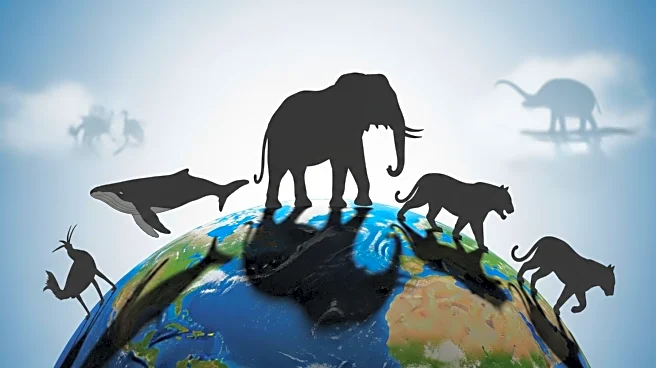What's Happening?
The International Union for Conservation of Nature (IUCN) is set to unveil its updated 'red list' of threatened species during its world congress in Abu Dhabi. This list categorizes plant and animal species from 'least concern' to 'extinct,' highlighting the dire state of global biodiversity. The congress, held every four years, aims to address the increasing threats to species due to habitat destruction, climate change, and pollution. The previous update revealed that over 47,000 species were threatened, with corals and amphibians being the most affected. The congress will also discuss synthetic biology, a controversial technique in conservation, with motions debating its compatibility with nature conservation.
Why It's Important?
The unveiling of the updated red list is crucial for setting the global agenda on environmental protection. It underscores the urgent need for conservation efforts to address the declining biodiversity, which has been worsening over the past decades. The decisions made at the congress, although not legally binding, can influence international treaties and accelerate conservation initiatives. The debate on synthetic biology could shape future conservation strategies, potentially integrating advanced technologies to complement traditional methods. This congress serves as a platform for governments, NGOs, and indigenous groups to collaborate on solutions for preserving biodiversity.
What's Next?
The IUCN congress will vote on resolutions that could impact international conservation policies. The outcome of the synthetic biology debate may lead to new approaches in conservation, balancing technological advancements with ecological preservation. The congress aims to foster collaboration among stakeholders to implement effective conservation strategies globally. The decisions made here could influence future environmental policies and initiatives, driving efforts to protect threatened species and their habitats.
Beyond the Headlines
The discussions at the IUCN congress highlight the ethical considerations of using synthetic biology in conservation. The potential for genetic engineering in natural ecosystems raises questions about the long-term impacts on biodiversity and ecological balance. The congress also emphasizes the need for inclusive conservation efforts that respect indigenous knowledge and practices. The outcomes could lead to a shift in how conservation is approached, integrating scientific innovation with traditional ecological wisdom.









